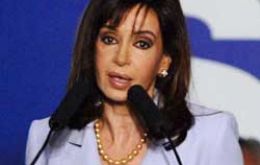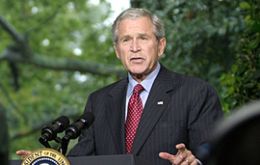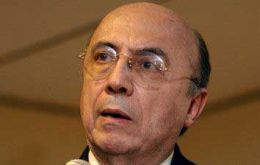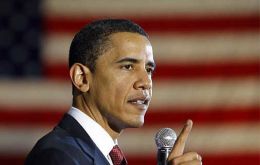MercoPress. South Atlantic News Agency
Economy
-
Thursday, October 23rd 2008 - 20:00 UTC
A 50 billion USD package to support Brazilian currency

Brazil's central bank said Wednesday it would pump the equivalent of 50 billion US dollars into currency markets to stem a two-month tumble in the Real that is threatening companies and stoked inflation.
-
Wednesday, October 22nd 2008 - 20:00 UTC
Private pension funds nationalization shocks Argentina

Argentine President Cristina Fernandez proposed Tuesday a government takeover of nearly 30 billion US dollars in private pension funds, saying pensioners must be protected from the global financial crisis.
-
Wednesday, October 22nd 2008 - 20:00 UTC
Bush invites G20 for crisis summit on November 15

Unites States President Bush invited leaders of the Group of 20 participants to a summit in Washington on November 15 on the global economic crisis announced the White House on Wednesday.
-
Wednesday, October 22nd 2008 - 20:00 UTC
Brazil Real down 33% in spite of billions USD in support

Brazil was forced to appeal to 22.9 billion US dollars in the past month, including sales of foreign reserves, derivatives and loans to prop the weakened Real punished by investors fleeing from emerging markets to more secure assets.
-
Tuesday, October 21st 2008 - 20:00 UTC
Financial meltdown could increase jobless by 20 million
The global financial crisis could increase world unemployment by an estimated 20 million women and men, the Director-General of the International Labour Office (ILO) said on Monday.
-
Tuesday, October 21st 2008 - 20:00 UTC
Recession and job cuts hit China's toy industry province

The global economic slowdown is starting to impact on China, the world's biggest industrial production centre. As many as half of all toy manufacturers in the Pearl River Delta could go out of business within the next two years an industry expert said on Monday following the closure of the Smart Union toy factory.
-
Tuesday, October 21st 2008 - 20:00 UTC
Fed support for new stimulus package boosts markets
United States Federal Reserve chief Ben Bernanke said on Monday more government spending may be needed to combat economic weakness. A fresh round of stimulus would be a good idea, he told the US House of Representatives budget committee.
-
Tuesday, October 21st 2008 - 20:00 UTC
Obama pledge to halt eviction of defaulting homeowners

Unite States Democrat presidential candidate Barack Obama has vowed to halt eviction of homeowners defaulting on mortgages, two weeks before the election. He was speaking in Florida, ahead of a joint appearance with his former rival for the nomination, Hillary Clinton.
-
Tuesday, October 21st 2008 - 20:00 UTC
Copper falls below 2 USD benchmark; lowest in three years

Copper tumbled below 2 US dollars a pound for the first time since December 2005, having dropped 34% so far this year. Speculation that the world economy is headed for a recession, including slower growth in China, anticipates a weaker demand for metals.
-
Tuesday, October 21st 2008 - 20:00 UTC
In spite of global crisis Latam countries avoid IMF
Latin American governments haven't yet turned to one traditional source of aid as they combat the global economic crisis: the widely vilified International Monetary Fund.
